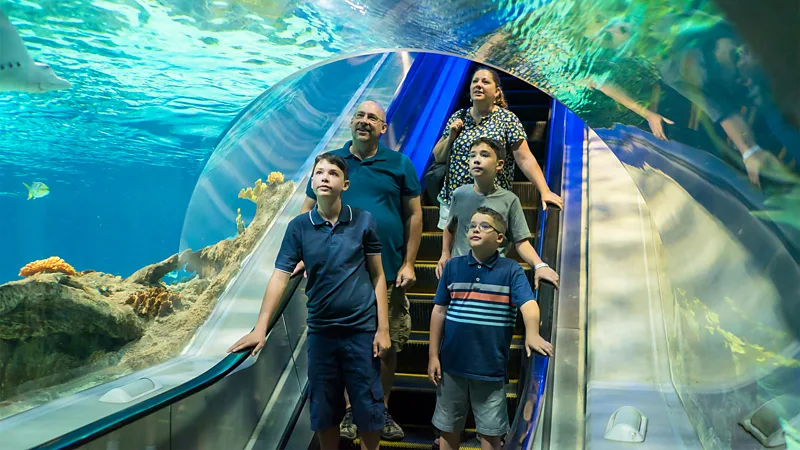'It seems like a simple thing, but it means a lot': How autism-certified destinations are changing travel
Travelling can be uncomfortable for neurodivergent people, including those on the autism spectrum. Increasingly, hotels, restaurants and cities are working to welcome these visitors.

From long security lines and delayed flights to packed trains and bumper-to-bumper traffic, travelling can be an uncomfortable ordeal. But for some people, the stresses of travel can be even more acute. Crowded noisy spaces, complicated social interactions and sudden changes in routine are particularly trying for neurodivergent travellers, including those on the autism spectrum.
Autism is a complex condition marked by differences in communication, social interactions and sensory input. According to the World Health Organization, it affects approximately 1% of children worldwide. The range and severity of symptoms vary, which means the specific accommodations needed by travellers need can also differ.
Travel can also be very rewarding for autistic people, especially when their needs and sensitivities are taken into consideration. "I think one of the greatest advantages of travelling is it gives us the opportunity to expand on the idea of what autistic people are capable of," said Kerry Magro, a best-selling author and speaker who was diagnosed as autistic at the age of four. "[It can help with] social abilities, communication, adaptability and also just self-awareness of who they are as individuals and what they like to do."
Some basic knowledge and simple accommodations can make all the difference in autistic people's travel experiences, and destinations are increasingly working to provide these to their visitors. For more than 20 years, the International Board of Credentialing and Continuing Education Standards (IBCCES) has been providing training to hotels, travel professionals and visitor bureaus across the globe who are interested in becoming more welcoming to autistic and other neurodivergent visitors. Currently more than 300 businesses are listed as Autism-Certified Centres, as well as three fully certified destinations, though there are a few more currently in the process of becoming certified, including Dubai and the Greater Palm Springs area in the US.
"We incorporate best practices from experts in the field, as well as autistic and neurodivergent individuals themselves [in our trainings]," Meredith Tekin, president of IBCCES, told the BBC. "So, you'll see individuals sharing their lived experience and sharing their recommendations in the trainings."
IBCCES offers trainings focused on sensory awareness and general sensitivity towards autistic people. They also occasionally conduct on-site visits to hotels and partnering cities to help identify additional opportunities to accommodate autistic travellers. The organisation's goal is to help destinations become more autism-friendly and help employees in the travel space to better understand accessibility needs. Once the trainings are completed, the organisation offers certification and lists businesses on the site Autism Travel, which compiles destinations and attractions that IBCCES deems are "autism certified".
IBCCES offers autism certifications for restaurants, shops and attractions (called "Autism Certified Centers"), as well as destinations and cities. "Certified Autism Destinations" are places where most tourism-related organisations in the area have received training, whereas "Autism Certified Cities" are given to places where organisations and businesses across the city have been certified.
The most recent destination to receive certification is Traverse City, Michigan, which earned certification in August 2024. Traverse City is known for its beautiful natural landscape and proximity to Sleeping Bear Dunes National Lakeshore. According to Whitney Waara, chief operating officer of Traverse City Tourism, the impetus for becoming an autism-certified destination was simply the wish to have more people able to enjoy the city. "We were really working on trying to make sure that our destination is welcoming to all," said Waara. "Making sure that we're ready to meet all the travellers that are coming with whatever needs that they have [has] been an important priority for us for the last several years."
The initiative was a particularly exciting project for Craig Hadley, executive director of Traverse City's Dennos Museum, whose son is on the spectrum and appears in the city's promotional video highlighting its recent certification. "It seems like a simple thing, but as a parent, it means a lot knowing that the person that you're speaking to understands kind of where you're coming from and why that resource is important for that family," Hadley told the BBC.
The museum participated in the certification process, training employees and implementing autism-friendly amenities like quiet spaces, sensory maps and several sets of noise-cancelling headphones available for visitors who are particularly sensitive to sound, as many autistic people can be. The Dennos Museum has also planned a few autism-friendly events, such as its sensory-friendly Halloween For All.
Traverse City took inspiration from Mesa, Arizona, which became the US's first autism-friendly city in 2019 when it was certified by IBCCES. What began as an initiative by the city's tourism board, started by the CEO's experience as the parent of an autistic child, quickly grew to a citywide movement when the mayor got wind of the plans.
"We spearheaded it and obviously shared it with the mayor and the city officials, and it just organically grew," said Alison Brooks, vice president of destination experience and advocacy at Visit Mesa. "I think it was just one of those things that was like the perfect timing. A lot of people [are] affected by autism in some way. So, of course, we knew this [was] the right thing to do."
In order to get the entire city certified, Mesa was required to have at least three businesses and organisations in several sectors – specifically tourism, education and healthcare – go through the process. However, many more businesses across the city signed up – so many, in fact, that Mesa now offers a "Live Life Limitless" passport that lists all the city's certified centres, including hotels, restaurants and attractions. The Autism Travel page on Visit Mesa's website also offers free sensory guides to seven of the city's most popular destinations that can be downloaded and viewed online before visitors leave home.
"Almost every day I run into somebody that didn't know that [the city] was certified," said Brooks. "But whenever I speak with a resident… it's just this sense of pride that they get."
For Magro, seeing the increasing willingness of cities and destinations to educate themselves about autism and become more accommodating to neurodivergent travellers is a positive sign. "I really hope this is not a fad," he said, "but a [new] reality that more of our community will be embraced with open arms."
-BBC







